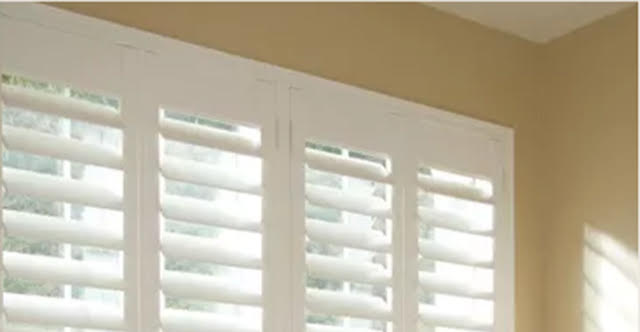
These shutters from Smith & Noble are made from a new nontoxic wood composite—they’re nontoxic and affordable.
I’m very excited to write this post today because it is the first post that contains links to my new Zero Toxics Knowledge Base. These links give you more information about the material, so I can link to that materials information again and again from different posts. Eventually you will begin to become familiar with materials as you read. Be sure to click through as you read.
One of the reasons why I love to do what I do is because my readers come to me all the time with products I don’t know about and ask me if they are toxic-free.
Often I point out toxic materials and reject the product, but yesterday one of my ongoing consulting clients (who doesn’t buy anything without running it by me first), brought some window shutters to me to check out. At first they looked suspicious, but they turned out to me wonderful, and opened the door to a whole new world of possibilities for affordable toxic-free products.
The description on the Smith & Noble website said “Eco Wood Shutters…These beautifully styled shutters are crafted to bring you all the beauty of wood alongside long lasting superior strength. Made from sustainable materials and featuring a tough poly coating that contains no VOC’s..Patented poly coating resists staining to ensure longevity in any environment.”
Eco wood..the beauty of wood…sustainable materials…sounds like wood but the description doesn’t actually say wood.
So I called customer service for my client and asked about it.
“Yes, It’s wood,” they said, “It’s a wood composite.”
“But this doesn’t make sense, “ I said. “Wood composites outgas toxic chemicals like formaldehyde. Why would they put a zero-VOC finish on a wood composite?”
“I’m pretty sure they made the composite with no toxic chemicals.”
“I need to know for sure what this composite is made of.”
“Well, I don’t know so you should just get our real wood shutters rather than the DuraWood.”
Ah ha! A brand name. I hung up from customer service and looked up DuraWood.
Yes yes yes!
Turns out that DuraWood is a wood and plastic composite that has the look, smell and feel of wood but has the durability of plastic. The great part is the plastic is polyethylene , which is one of the least toxic materials on the planet.
The finish is zero VOCs because it’s not a finish at all. It’s “poly” (polyethylene).
You can go online and type in “durawood” and you will find all kinds of products made with this materials.
I haven’t yet seen a sample of this material, but on paper it checks out as toxic-free.
Smith & Noble also sells Durawood blinds , which would be another affordable choice.
COMMENTARY ON PRODUCT DESCRIPTION
This is yet another example of businesses giving insufficient information on the health aspects of the product.
The material is actually nontoxic, but they don’t tell us that. I had to call customer service and even they didn’t know what to say to me. I had to research the material myself.
It would have been so much better if they would give full disclosure, tell us about the materials, and show us it’s OK for us to use.




Debra, I was on the Smith and Noble site. The Eco-Wood Shutters say they are coated with polypropylene. Is there a misprint somewhere? Or is it the same as polyethylene?
Ah! I love my new Zero Toxics website! I have a post for each of these materials. All I have to do is give you the links and you can read all about them!
Polypropylene on Zero Toxics Knowledge Base
Polyethylene on Zero Toxics Knowledge Base
I agree! Companies should give us full disclosure of the materials they use in their products. This way we don’t have to go crazy researching everything. It would make things so much easier. Thanks so much for all your research! It is so greatly appreciated!
I love all your sites, by the way
Can not wait till they start making regular blinds.